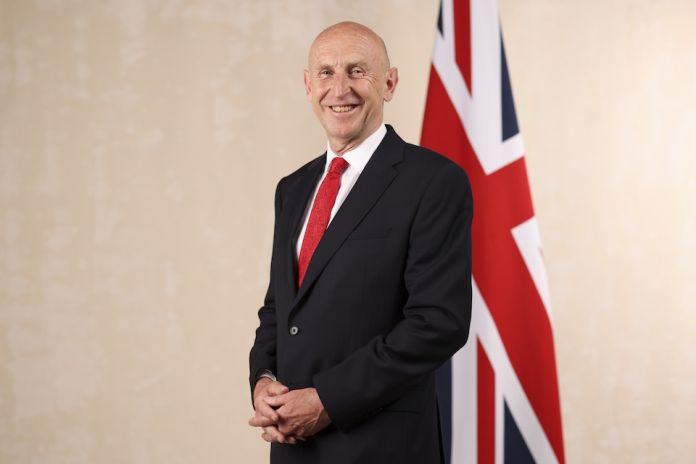
Defence Secretary, John Healey, provided an update to the House of Commons on the war in Ukraine – including details of Ukraine’s defensive operation in the Kursk region of Russia.
Mr Speaker, it has now been 930 days since Putin launched his full scale, illegal invasion of Ukraine.
930 days in which, Ukrainian Forces have fought heroically, while also communities have endured relentless attacks, children have been stolen to Russia, and families have seen their homes destroyed.
Yet, throughout everything, Ukraine has stood strong in the face of Russian aggression.
And since day one, when I sat in the honourable gentleman’s place opposite as Shadow Defence Secretary, this House – and our country – has been united for Ukraine.
In Opposition, Labour backed every package of military aid, every sanction on Russia, every scheme to support civilians, like Homes for Ukraine. And I know the Opposition will continue to work with the Government in the same way because this House stands united for Ukraine.
Mr Speaker, I’ve been proud of UK leadership on Ukraine and I am determined that UK leadership will continue. And I am also determined to work across this House.
So, I will offer Opposition leaders regular intelligence assessments on the conflict. I will offer MPs of all parties regular MOD and FCDO briefings – the second one took place this morning within MOD and now more than 100 colleagues from all sides of the House have attended. And, Mr Speaker, the House will receive regular updates on the conflict from me.
Mr Speaker, Ukraine is a first order priority for me as Defence Secretary and for this new Government. That’s why, on the second day in the job, I flew to Odesa and I joined President Zelenskyy and his team for the afternoon.
I told him the Ukrainians’ courage inspires the world. I also told him that at this critical moment, this new Government would step up support for Ukraine.
So in our first week, we announced a new package of UK military support – including ammunition, missiles, artillery guns; a new commitment to speed up the deliveries pledged by the previous Government; and a promise to spend £3 billion a year on military support for Ukraine this year, next year and every year for as long as it takes.
And in the weeks since, Mr Speaker, we have stepped up support still further:
We signed a new £3.5 billion Defence Industrial Support Treaty; hit the £1 billion milestone for the International Fund for Ukraine; advanced the UK-led Maritime and Drone Capability Coalitions; and agreed a new £300 million contract for artillery shells.
And then on Friday, last week, at the Ukraine Defence Contact Group in Ramstein, I announced a new £160 million production contract for air defence missiles, and I also announced the UK’s Operation Interflex, which has trained 45,000 Ukrainian troops since 2022, will extend beyond this year and throughout 2025.
This support is both short term and long term. Immediate provision and long term production, training troops today and developing Ukrainian forces for the future.
This approach gives Ukrainians the confidence to plan, and it sends a signal to Putin that we the UK, and our allies, will stand with Ukraine for as long as it takes.
Mr Speaker, there have been important battlefield developments during the past month.
In the first week of August, Ukrainian forces launched a remarkable offensive across Russia’s border into the Kursk region. This exposed the vulnerabilities of Putin’s frontline forces, and it demonstrates Ukraine’s ability to achieve surprise strategic attacks.
It also helps better defend Ukraine and its northern centres by pushing back the sites from which Russia can launch deadly attacks.
Around 900 square-kilometres of territory is now held by Ukrainian forces in the Kursk region. This has put Putin under pressure.
After initial disarray, Russian forces are now deploying to the area in greater numbers.
But eastern Ukraine continues to be Russia’s main focus, with tactical advances bringing Pokrovsk within approximately 8km now of the frontline.
And with Russia continuing to rely on infantry-led assaults, its casualties remain high and rising. Daily casualties have doubled from this time last year, with Russia averaging more than 1,100 a day killed or wounded in July and August alone.
Meanwhile, recent Russian air bombardments have been some of the most intense since the start of the war. President Zelenskyy stated on Friday, in Ramstein, that 4,000 missiles and drones were fired at Ukraine in the last month, targeting critical national infrastructure, attacking civilian centres, including Poltava and Lviv in the last week.
Since 2022, the impact of this has been that Russia has destroyed or it has captured more than fifty per cent of Ukraine’s power generation capacity, forcing Ukraine to implement power outages with winter approaching.
Meanwhile at sea, Ukraine has scored some significant successes. Driving Russia’s fleet out of the western Black Sea to reopen export routes, destroying or damaging 26 Russian Naval vessels operating in the Black Sea, including a Russian Kilo-class submarine just last month.
Despite these notable achievements, Russian pressure across the whole frontline will continue in the months ahead.
Russian industry remains on a war footing, Russian artillery is outfiring Ukraine by at least three to one, and Russia is also conscripting or recruiting 400,000 additional soldiers this year.
So for the coming weeks, two things are clear:
Ukrainians need to strengthen their frontline in the east and they will look to hold the territory in Kursk. The longer they hold Kursk, the weaker Putin becomes. The longer they hold Kursk, the better defended Ukraine will be.
This was discussed at the US-led Ukraine Defence Contact Group last Friday that I attended with other defence ministers and President Zelenskyy. It was where military support and unity for Ukraine was strengthened among 50 allied nations, and where the US Defense Secretary, Lloyd Austin, served an important reminder to everyone: “If Ukraine is not free”, he said, “the world is not safe”.
And that’s why the defence of the UK starts in Ukraine. And if President Putin prevails in Ukraine, he will not stop at Ukraine. If big nations redraw international boundaries by force, the sovereignty and security of all nations is undermined.
That’s why UK support, alongside allies, is so important. Military, economic, industrial and diplomatic support.
Mr Speaker, I also want this House to know: we are seeing clear growing signs of Russian aggression beyond Ukraine. NATO allies are reporting Russian drones violating their airspace.
The heads of the UK and US security services confirmed that Russian intelligence is, as they said, conducting a “reckless campaign of sabotage across Europe”.
And last week, the National Cyber Security Centre revealed last week that Russia’s specialist GRU unit is conducting offensive cyber operations directed at governments and civilian infrastructure.
Putin is targeting our security. He is targeting our way of life. We face a decade of growing Russian aggression.
But this is a Government that will protect our people and this country. We will actively deter and defend against Russian threats, working in partnership with our allies.
And that’s why, as a new Government, our defence policy will now be NATO first.
Mr Speaker, as we approach 1,000 days of war, this conflict is at a critical moment.
That’s why the UK is stepping up support. Because this isn’t just Ukraine’s struggle. It’s our struggle too.
Ukraine is fighting to regain its sovereign territory, but it’s also fighting to reinforce peace, democracy, and security in the rest of Europe.


